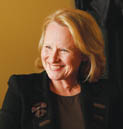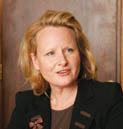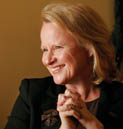Entre Nous with Ann Dowsett Johnston, Vice-Principal of Development, Alumni
Entre Nous with Ann Dowsett Johnston, Vice-Principal of Development, Alumni McGill University
User Tools (skip):
 |
 |
 |
Ann Dowsett Johnston has been an advocate for higher
education for years in her role as journalist and editor at
Maclean's.
Owen Egan
Entre Nous with Ann Dowsett Johnston, Vice-Principal of Development, Alumni and University Relations
Telling McGill's story
More than 25 years in journalism — including 14 spent raising the profile of Canadian universities as an award-winning writer and the architect of the Maclean's annual rankings — have given Ann Dowsett Johnston a passion for telling stories about higher education. Since February 6, she has been Vice-Principal of Development, Alumni and University Relations (formerly Development and Alumni Relations), and has brought with her a determination to broadcast the McGill story far and wide.
What made you move from your successful journalism career to your new position at McGill?
I felt I had done all I had meant to do with the university coverage, and was ready for a new challenge, one that would truly engage me. In retrospect, the transformative moment came last fall, the day of the ceremony for Seymour Schulich's gift to the School of Music. I was here covering the story, and when I watched the music students pour onto the stage, wearing their "Merci Seymour" T-shirts, I was very moved.
There has been an enormous gap between American and Canadian funding to public universities over the past 20 years, and now, there are also enormous gaps in terms of provincial funding within Canada. There is no question that many people will have to step forward, as Seymour Schulich did, to help McGill remain internationally competitive. Schulich made a huge contribution, and now he's challenging others to do the same. The principal's vision for reinforcing McGill's excellence is extraordinarily strong, and I have enormous faith that Heather Munroe-Blum will succeed in leading this university to a great position of strength. But her vision will demand new resources, and that's why I'm here: to help make this vision a reality. We're at a fork in the road, and we must make a profound case for support from people and foundations — both in this country and around the world.
When you arrived, you also took on the university relations portfolio, which oversees McGill's public communications, and DAR became DAUR. Why is this change important?
McGill is a Quebec institution with huge national and international prominence, and our stories need to be told well, and in an integrated way, to our various constituencies. What is clear to me is that people care profoundly about McGill, but they don't always know how best to connect or reconnect with this university. We have communities internationally, nationally and locally who want to be engaged, and I want to help lead that effort. We live in an incredibly competitive world. There is an urgent need to reinvest in this great university.
You are just over two months into your new career — what have you been up to?
I've been meeting with everyone from students to deans to donors, exploring the ways in which I can best lead DAUR. On one of my first evenings, I returned to my office in Martlet House and discovered a huge hub of activity: there were deans and volunteers and students in every office, calling donors as part of a Thank-a-thon. The place was lit up like a Christmas tree, and it got my imagination going. We have enormous potential at Martlet, not only to reach out to our alumni and broader community, but to engage students as well. Few undergraduates know of Martlet House, which is a beautiful entity—Sam Bronfman's legendary headquarters on Peel. This fall, we'll be opening our doors to students; holding seminars and cinq à septs.
With some creative thinking, we could do so much. Since I've arrived, we've transformed the windows, removing two tarnished trophies and replacing them with celebratory posters of recent and former McGill Olympians, and two generous donors, Seymour Schulich and Marcel Desautels. It's a small but important transformation. Now when I head down Peel, I see strangers stopping at the Martlet windows, reading about McGill successes. People are interested in the stories those windows tell, and great story-telling is key.
People ask if I have fundraised before, and I haven't. But I have led large teams, and worked with a huge number of talented people. The senior executive team of this university is an extraordinary group, and the team at Martlet is terrific. And, in my first three weeks, I have managed to raise a significant amount of money. At heart, I'm a story teller. And if we tell the McGill story well, I believe we will be enormously successful.
Ann Dowsett Johnston's first job: Information Central
My first real job, after graduating with a degree in History and English, was working in the new computer facility at the Canadian National Railway in Jasper. I was saving to go to Europe. It was my job to tell head office in Montreal where each car was heading, and I met a film student who was earning money as a brakeman. Months later, he and I went to Toronto to seek our fortunes in film and journalism, and eventually I married him. He became a film director, I became a journalist—and it took us many years to earn the same salaries we had earned on the railroad!

